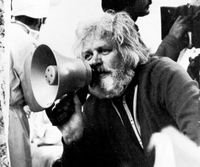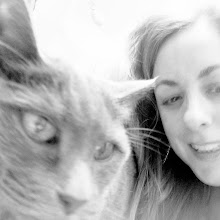Twin Infinitive: Part Five
"It is always better to be a coward and live to fight another day. The life of novelty groups is always limited. The twins returned to Norfolk and the obscurity from which they came."
-- Brian Aldiss,
Brothers of the Head The following exclusive was preceded by four Seattle Film Blog entries. Former Seattleite Keith Fulton, along with filmmaking partner Louis Pepe, is the director of Brothers of the Head, which opened at the Varsity Theater on Aug 11. I met with him this June during the Seattle International Film Festival.
To read parts one through four, please
click here.
On Mockumentary, Documentary, and Casting Fennessy: So, in terms of the approach that you used, which I'm sure that you're not thrilled that some people have described as mockumentary--which it obviously is not...
Fulton: Well, because it's not appropriate.
Fennessy: No, it's not appropriate. Other people have done it, and maybe gotten away with it more--gotten away from that word--because of their reputation. I think in
Sweet and Lowdown, which is a very different film, but it's Woody Allen, who's done that before with
Zelig, and maybe even other films...
Fulton: I don't think
Zelig is completely documentary format, but I haven't seen
Sweet and Lowdown.
Fennessy: It does the same thing, and it's actually a tragedy, as well, because it's about this guy [Sean Penn] who thinks he's one of the greatest guitar players in the world. What he [Allen] does that's so cool--he does what you guys do, but to a different effect--is that some of the people are real. He's got real jazz critics talking about this guy's playing and then he's got actors. If you don't know anything about jazz, you have no idea. If someone didn't know who Ken Russell was [below right, on the set of
Tommy], I think they would assume he's an actor. I like that.
 Fulton:
Fulton: We're only sensitive about that term--mockumentary--because it suggests comedy.
Fennessy: Which is in the film, but it's not a comedy.
Fulton: Yeah, I mean there are funny parts in the film, but if you say literally: What is a mockumentary? Well, it's a fake documentary. But I think now it's got the connotation of comedy--people think about Christopher Guest films. I really like those films a lot, actually, but it's a genre of its own, and we were trying to use more documentary techniques to make a stranger kind of fiction. You know, like this thing I was talking about with the unreliable narration. You can get something using that documentary style that you can't get out of a normal narrative. In a normal narrative, you might distrust a character, but you can't get the sense of a character controlling the story
and you can't trust them. That's something you can get from a documentary. Like, I don't know if you ever saw Errol Morris's
Thin Blue Line...
Fennessy: I've seen almost all of his films, but not that one...it's on the top of my list. I love Errol Morris.
Fulton: It's all interview based, but you don't know the truth through most of the film--I don't think even by the end can you completely resolve the truth... And you don't trust all the people who are talking. It's a very interesting thing to play with.
[When I interviewed John Scheinfeld, director of the documentary
Who is Harry Nilsson, he also mentioned this film.]
Fennessy: And he continues in that vein with
The Fog of War...
Fulton: Yeah, that's a wonderful film.
Fennessy: Where this guy [former Secretary of Defense
Robert McNamara] appears to be incredibly forthcoming, but he's had all these years to find certain ways to say certain things...
[Scheinfeld and I talked about this film, too; he interviewed McNamara as a
Dr. Strangelove DVD extra.]
Fulton: Right.
Fennessy: Because he knows he's responsible for many deaths all over the place. You can tell he's really trying to phrase things carefully, and it's fascinating to watch that process, and you end up kind of liking him, thinking, 'Yeah, that must have been a horrible thing to have made those decisions and then to have to live with them.' I thought he was brave to do the film, actually.
[Scheinfeld found him intimidating.]
Fennessy: So, did you get any pressure to cast people who were better known in the lead roles?
Fulton: No, none.
Fennessy: That's amazing.
Fulton: It was a gift, because
Brothers of the Head is not a cheap film. It was a five-million dollar film. Well, you know, it was cheap by big-budget Hollywood standards, but it's not cheap on the independent scale of things. So, to have a film of that budget level with the complexity this had--I mean, it had lots of locations, it had lots of cast members--and not to have the pressure of having to use celebrities? It was incredible. I mean, it was a joy, because if you had celebrities in, it would have ruined the movie.
Fennessy: Yeah, and they might not have been able to do the things and look the way...
Fulton: You're watching this thing that was meant to have been shot in 1974, and it's meant to feel kind of gritty and real, and you've got Matt Damon in it, strapped to...Greg Kinnear!
[He's referring to the Farrelly Brothers comedy
Stuck on You.]
Fennessy: And I like Matt Damon.
Fulton: I like him, too.
 Fennessy:
Fennessy: But in some movies--I hate to say it--but in
The Brothers Grimm, I didn't like him. Is that something that you've thought about, as someone who's made documentaries about Terry Gilliam...? I've seen
Lost in La Mancha, I haven't seen the film about
Twelve Monkeys [
The Hamster Factor], but I have the book
Gilliam on Gilliam, where he talks about
Twelve Monkeys, and he's really frank. He's like, I didn't want Bruce Willis and I didn't want Brad Pitt, and the studio said these are who we want you to use, and he says, the better I got to know Bruce Willis, the more I worked with him, I thought, you know what, this guy's gonna be fine--but this Brad Pitt is
terrible.
Fulton: [Laughs]
Fennessy: And so, Brad Pitt the whole way is working with this coach, and he's getting better, and finally Terry says, this guy's working so hard and he's just about there, but he makes it clear: I didn't want these guys. And he says who he wanted, which I can't remember, but one of them was from
The Fisher King--it was either Robin Williams or Jeff Bridges. And this happened again. I know it happened with
The Brothers Grimm, as well.
[Gilliam wanted Nick Nolte and Jeff Bridges for
Twelve Monkeys and Samantha Morton for
The Brothers Grimm.]
Fulton: We documented his work with that coach.
[Pitt received an Oscar nomination for his efforts; Willis did not.]
Fennessy: And in light of you guys having worked with Terry Gilliam, you must have felt this was pretty awesome--we're newer filmmakers and yet we can work with who we want. Is it because he's working with bigger budgets? You would think he'd have earned the right not to have to...
Fulton: No.
Fennessy: No?
Fulton: I don't think he ever earned that right, basically.
Fennessy: Even Martin Scorsese, I know, has pressure to cast certain people.
 Fulton:
Fulton: Well, look at somebody like Steven Soderbergh, a filmmaker for whom I have a lot of respect. He's definitely a filmmaker who sort of does one for them [the studio] and does one for him. You look at a film like
Bubble [right], which was made recently. It's not full of celebrities, and it was shot in a very humble fashion--you know, a very inexpensive film to make.
Fennessy: And even
Schizopolis--Steven Soderbergh is the lead.
Fulton: Is he? I need to see it.
Fennessy: Yeah, and his wife--his ex-wife--is the female lead.
Fulton: He gets to make films that he wants by getting the pressure off of him. He's not gonna get to make a film like
Ocean's 11, and cast whoever he wants. I think he makes those films to keep himself afloat, frankly--but he even does those well.
[Weird that both Damon and Pitt star in that series...]
Fennessy: He does.
Fulton: He does crass commercial things as well, I suppose, as really independent fare. But no, we were just plain lucky not to have that pressure.
Fennessy: And it's a good cast. Having seen
24 Hour Party People and
Frozen, I really like Sean Harris [Nick Sidney]. I like him in everything I've seen him in, and he always looks quite different, too. So that was interesting--to see him being tortured Ian Curtis and then being a
torturer. Interesting little switch there.
Fulton: Yes. [laughs]
Fennessy: So, you read
Please Kill Me. Did you watch any particular films? I know you read about conjoined twins.
Fulton: We watched
Gimme Shelter.
Fennessy: Which at least one reviewer has mentioned.
Fulton: I'd seen that when we were in grad school. Also,
Cocksucker Blues, the film by Robert Frank.
Fennessy: It's funny, because I came across a review that mentioned
Performance,
Gimme Shelter, and
Cocksucker Blues.
Fulton: Performance we hadn't watched. I watched
Performance for the first time after we made
Brothers of the Head, because people kept bringing it up.
Fennessy: It's kind of bad...and great at the same time. I walked out of a screening in college.
Fulton: It is bad! [laughs] And it's Nicolas Roeg, right? Who I like.
Fennessy: And
Donald Cammell, who some people say is more responsible for the film than Nicolas Roeg. But what keeps it going--something that's also true of your film--is the dynamic between the two lead actors [Mick Jagger and James Fox]. Everything around that is...interesting to look at, but it didn't make much sense to me.
Cocksucker Blues, I haven't seen.
Fulton: Not many people have, it's kind of hard to track down.
Fennessy: I was in England when they did a Robert Frank restrospective [at the Tate Modern], and they showed all his films, because apparently you can show
Cocksucker Blues in a museum context. I happened to miss it, but I saw his photographs and short films. That was a bummer that I couldn't actually see the movie. I've seen a lot of clips from it, because someone [Sarah "Buzzy" Jackson] did a presentation at the EMP Pop Conference about three years ago, and she showed clip after clip. Her point was that it's a boring movie. And I think she made her point.
Fulton: [Laughs]
Fennessy: I liked the music in the film and I thought you guys achieved what you were trying to, and yet I did read a couple of reviews... One person, on a site called
DVD Verdict--and this is a good review, they liked the movie--said the music was "atrocious," which they thought was intentional. And then in the
Variety review, the twins are described as "massively untalented."
Fulton: [Laughs]
Fennessy: And I kind of thought both reviewers missed the point, because they do start out as massively untalented, and then they become more talented, but these are both good reviews...
Fulton: Yes, but you can probably bet that both of the people who wrote those things don't like this type of music.
Fennessy: That's what I was thinking, because they liked the film.
Fulton: People who like this type of music invariably like it. I would hate to think I made a film with terrible music--that we got it wrong. I've talked to so many people who like this kind of music and loved the music, so I figured we got it right.
Fennessy: To me, they sounded like
Magazine actually, and I saw in the press notes, somebody mentioned Magazine.
Fulton: That was one band. There were others...
Fennessy: So, it was not my imagination. Then, I guess, one last question. I came across another review that said: Imagine if Noel and Liam [Gallagher] from Oasis were joined together--this is what you'd end up with. I thought that was a pretty funny image, because these guys, these two brothers, have just been at each other in the press and in private for years. Were you thinking of any real-life musician brothers at all?
Fulton: Nope.
Fennessy: I think people in England will see a Liam-Noel thing.
Fulton: I don't even know Oasis. People kept mentioning them, I had never heard them.
Fennessy: If you like the Beatles...
Fulton: They're similar?
Fennessy: Yeah, with more kind of a Radiohead, '90s edge.
Fulton: Radiohead I know and like.
[The publicist came in to let us know our time was up.]
Fennessy: I do, too. Well, thank you so much for your time.
Fulton: Thank you. Now, I need to go and have a smoke! [laughs]
Come now, gentleman, your love is all I crave.
You'll still be in the circus when I'm laughing,
Laughing in my grave.
-- Jagger/Richards, "Memo from Turner" (1970)
Endnote: To my mind, there are few things more excruciating than transcribing interviews. In this case, however, Fulton's melodious voice made the task less painful than usual. Brothers of the Head ends its run at the Varsity this evening (4329 University Way NE). And speaking of mockumentaries, Christopher Guest's For Your Consideration, a satire on awards shows, opens in Seattle on Nov 17.
 From today's TV listings:
From today's TV listings: Nice! I'll be tuning in for sure (the White Stripes segment, incidentally, is a repeat).
Nice! I'll be tuning in for sure (the White Stripes segment, incidentally, is a repeat). 















 The gentleman pictured to the left is a Barkley. He isn't the Barkley in question. So yeah, "Gnarls" is a terrible name--Charles is classier--but what can ya do. To quote the Bard, "What's in a name? To quote
The gentleman pictured to the left is a Barkley. He isn't the Barkley in question. So yeah, "Gnarls" is a terrible name--Charles is classier--but what can ya do. To quote the Bard, "What's in a name? To quote 